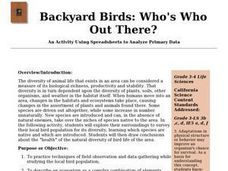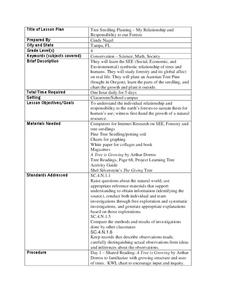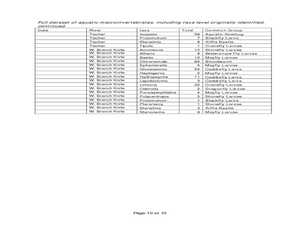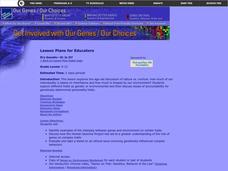Curated OER
See You Later, Alligator
Students explore the historical and social significance of animals as cultural symbols in various countries around the world, as well as the impact that humans have made on the population and natural habitats of these animals.
Curated OER
Insects Are Helpful!
Students see that insects do lots good and are very valuable to humans and nature. This is part of an ongoing effort to dispel fears of insects. They rotate through a series of centers that have examples of how insects contribute to our...
Curated OER
Fires and Fire Suppression
Students examine their assumptions about forest fires. They explore the conflicts involved with the forest service's new strategy. in addition, they will study one case where a prescribed natural burn had a significant impact on a later,...
Curated OER
Environmental Health Hazards and Children
Students are introduced to the environmental hazards their community is facing. In groups, they develop a list of the ways humans have changed the Earth and how these changes have lead to environmental hazards. They record their...
Curated OER
Our Population and Its Impact on the Planet
Students explore environmental problems due to the growing worldwide human population and examine the growth rate. They also discuss possible ways to stabilize population growth and increase sustainable development.
Curated OER
The Golden Ratio
Seventh graders investigate a ratio found in nature and in numerous pieces of artwork throughout history. The lesson is cross-curricular and builds a sense of appreciation of design for students.
Curated OER
Boston Harbor Cruise: A Shoreline Survey
The learners take a harbor cruise, photograph, and draw shore line features attending to evidence of human impact/consequences, and its cost on marine/land animal habitats vegetation, weather patterns, signs of erosion, and the water...
Curated OER
Backyard Birds: Who's Who Out There?
Students practice techniques of field observation and data-gathering while studying local bird population, describe ecosystem as complex combination of elements, which can affect or be affected by each other, and determine effects of...
Curated OER
Three Levels of Government
Students name and broadly classify the powers and duties of each level of executive government in Australia. They identify and examine areas of overlaid and cooperation between various executive levels. Students examine the nature of...
Curated OER
Tree Seedling Planting- My Relationship and Responsibility to our Forests
In this trees lesson plan, 4th graders read the book, A Tree is Growing and complete a KWL chart on how trees grow and how they are used. Students research the symbiotic relationship of humans and trees, create tree collages, plant a...
Curated OER
fun with Plants that We Use
Students become familiar with the products made from various plants. In this plants lesson, students experiment with natural dyes from plants. Students complete a list of things made from plants. Students answer questions about plant...
Curated OER
Symmetry
Students explore symmetry. In this geometry lesson, student identify and define bilateral symmetry, radial symmetry, pentagonal symmetry, hexagonal symmetry, and cubic symmetry. Students construct examples of these types of symmetry and...
Curated OER
Chemicals, Chemicals, Everywhere
Students divide substances into categories: made of chemicals/not made of chemicals, synthetic/naturally occurring, and toxic/nontoxic. They observe a mystery chemical and determine what precautions they need to take when handling an...
Curated OER
Mexican "Tona" Animal Masks
Students study the Mexican legend related to masks. They select an animal with traits they can identify with and recognize in themselves. Afterward, they create a mask that will retain some human features, but take on the life of the...
Curated OER
Get to Know Birds
Students observe animals in their natural habitats. In this bird identification lesson, students observe birds by watching and listening and report on the sightings they made. Students also document bird signs such as tracks, nests and...
Curated OER
The Empirical Challenges of Racial Classification
This lesson plan will help students examine their preconceptions and assumptions about racial categories and understand the impossibility of constructing a consistent system of human racial classification.
Curated OER
Water Cycle
Ninth graders explore ways water moves through various reservoirs on Earth, examine how human activities change water cycle, investigate substances present in water that indicate human activity, and discuss how understanding water cycle...
Curated OER
Pump It Up
Students use water in a flask to simulate how oil is pumped or forced out of the Earth by pressure from natural gas or human machinery. In this oil lesson plan, students complete a lab packet and work in groups.
Curated OER
Aquatic Invertebrates
Learners examine the impact that human development has on streams. In this stream sampling lesson students compare macroinvertebrate data and graph it.
Curated OER
Answering the Call of the Wild
Students explore wildlife conservation by investigating the reintroduction of species into their natural habitats and species near extinction. They create a poster and a position paper that explains the importance of preserving this...
Curated OER
It's Genetic--Or Is It?
Students identify examples of the interplay between genes and environment on certain traits and discuss how the Human Genome Project has led to a greater understanding of the role of genes on complex traits.
Curated OER
Avalanche And Landslide Hazards in Canada
Students explore where the natural disasters, avalanche and landslides, are most frequent in Canada and investigate their associated causes and effects. They navigate the Atlas of Canada Web site for natural hazards.
Curated OER
Non Native Species: English Ivy-Landscape Plant or Deadly Killer?
High schoolers study the impact that invasive species have on biodiversity and more natural areas.
Curated OER
Something Fishy - Bioaccumulation of Mercury
Young scholars explore the dangers of eating high levels of mercury and how small amounts of mercury in water accumulate in greater quantities in organisms higher in the food chain. They list the health of effects of high levels of...
Other popular searches
- Philosophy of Human Nature
- Democracy and Human Nature
- Essays on Human Nature
- Human Nature Hobbes
- Human Nature Good
- Enlightenment Human Nature
- Human Nature in Plays
- Human Nature Environmental
- Poetry on Human Nature
- Aristotle Human Nature
- Human Nature Enviromental

























